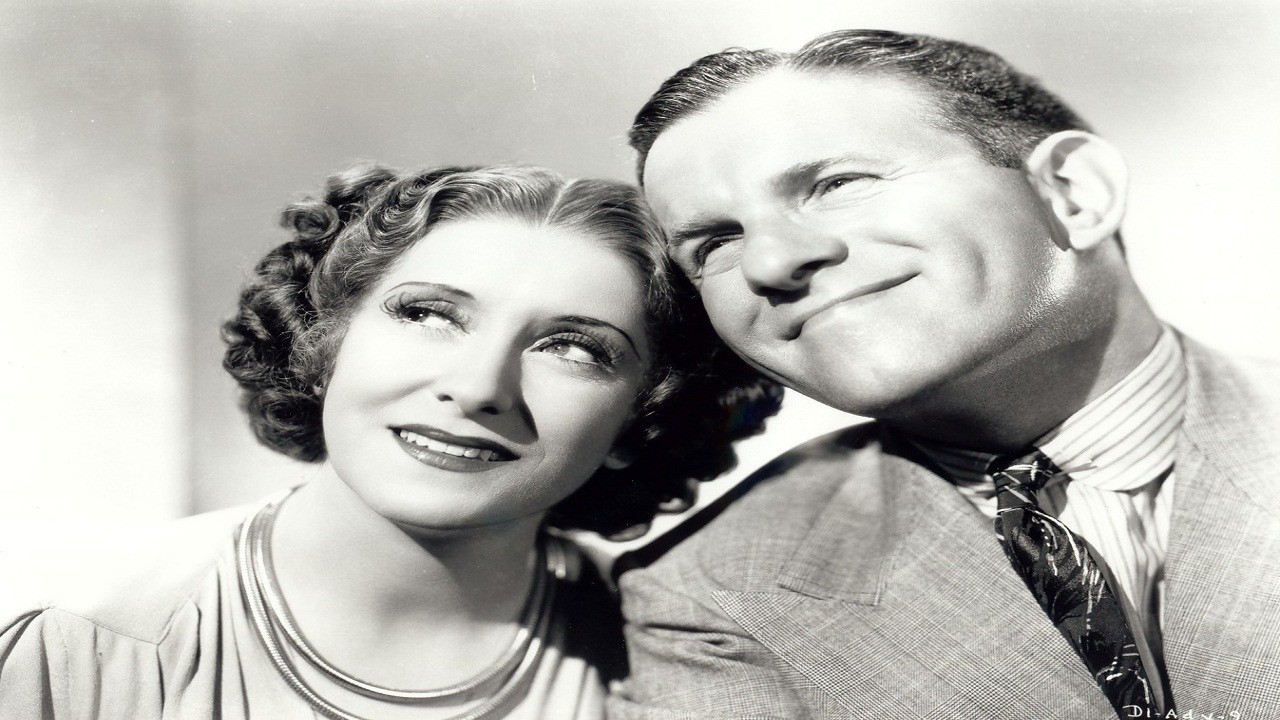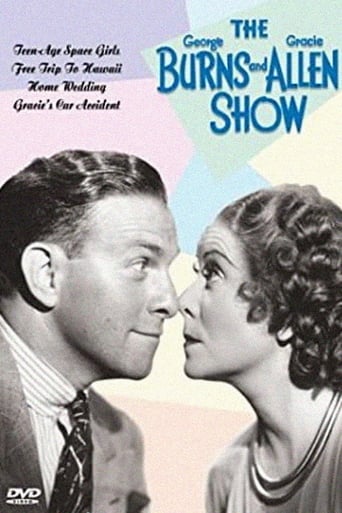



A bit overrated, but still an amazing film
One of the best movies of the year! Incredible from the beginning to the end.
View MoreI think this is a new genre that they're all sort of working their way through it and haven't got all the kinks worked out yet but it's a genre that works for me.
View MoreThere's no way I can possibly love it entirely but I just think its ridiculously bad, but enjoyable at the same time.
View MoreGeorge Burns was one of the earliest pioneers of radio and television and he remained a staple of TV with frequent appearances well into the 1990s, when HE was well into his 90's. At the end he was still cracking jokes about his loony wife and longtime comedy partner Gracie Allen (whom he always claimed was the more talented one), but after her death in the early '60s, Gracie became increasingly under-appreciated for her comedy contributions while former-dramatic-actress Lucille Ball rose to prominence as the reigning queen of comedy. No disrespect to the talented Lucy (whose comedy style was more sight-gag oriented), but thanks to reruns of "Burns and Allen" on Antenna TV, I've come to the realization that Gracie was the one who paved the way for Lucy to become an icon.George and Gracie moved from stage to radio in the early '30s, and by the '40s they'd honed and perfected their crazy-housewife-sitcom in which they portrayed exaggerated versions of themselves. Suddenly TV was catching on and George decided that was the next logical step in their careers; Gracie was already contemplating retirement, but succumbed to her husband's desires and they took their act to TV in 1950 (a year before Lucy). The setup was the same: Gracie was a "dizzy" housewife confounding everyone she met with her illogical perspective of the world; George was the adoring husband who loved her not despite her silly quirks but because of them. Their best friends were their neighbors, Blanche and Harry Morton, who were continuously getting mixed up in Gracie's shenanigans. Taking inspiration from the play "Our Town," Burns frequently stepped out of scenes and directly addressed the audience. There was frequent talk of their TV show, but George was the only one who was self-aware that THIS was the actual show.The first two seasons were broadcast live biweekly but they encountered a variety of problems. Gracie was a consummate professional but, having become accustomed to reading off paper on radio, she was daunted by the staggering amount of confusing dialogue she now had to memorize for each show and was becoming increasingly unhappy. Hal March originally played Harry Morton but he left after 7 episodes when offered another show; John Brown stepped into his shoes and was let go after 10 shows when his name showed up on a Hollywood blacklist; and ultimately Fred Clark was given the part. Three Harrys became FOUR Harrys by the end of the first season when original announcer Bill Goodwin left and was replaced by Harry Von Zell, who portrayed himself. Because coast-to-coast transmissions were not yet the norm, they also had problems with other shows swiping their jokes before kinescope copies of new episodes were broadcast in various markets.By the end of the second season, Lucy & Desi had revolutionized TV by shooting on film and George wanted to follow suit, but CBS wouldn't offer additional funding. Using his own money, George set up McCadden Productions and began shooting episodes on film. Not only did this prevent the sorts of blunders that occurred during the live seasons, but it afforded Gracie some extra time to breathe and figure out her next illogical rant. The shows were screened for a preview audience so they could capture organic laughter for each joke, and George and Gracie would then film their stand-up routine that closed each show. An unhappy Fred Clark was having difficulty sustaining a long-distance relationship with his wife and went to George demanding an exorbitant pay raise; George decided the best solution was to let Clark out of his contract. There was talk of killing off Harry Morton or having him run away with another woman, but ultimately he was replaced by Larry Keating. Drastic adjustments were made to the character to suit Keating, but otherwise it was business as usual. By the sixth season, there was concern that the formula was becoming stale, so George decided to relocate the characters to a Manhattan hotel and bring his son Ronnie in to add a new dimension to the plot. Charismatic and camera-friendly Ronnie was a fine addition to the cast (though from a 21st century perspective the character was a shameless womanizer) but the hotel setting didn't offer the comedic opportunities that they'd hoped for, so the setting returned to Beverly Hills for the final two seasons. It was at this point that George came up with the idea to add a "magic television" which allowed him to spy on his friends and neighbors and humorously meddle in their lives. The sponsors hated the notion of this plot device, but Burns stood firm and later credited himself with creating TV surveillance.Throughout the final seasons, Gracie's health was deteriorating and she was tired of the daily grind of working on the show. George kept circumventing her to sign contracts for additional seasons, but by the eighth season Gracie demanded she be allowed to retire. George relented, but figured she'd soon change her mind, so he carried on. In the following season's "The George Burns Show," the setting was changed to his downtown office, Blanche became his secretary, Harry Morton worked down the hall, and Ronnie and Harry Von Zell continued to wander in and out. Gracie was a frequent topic of conversation but she was enjoying her retirement too much to return. To boost ratings, variety show segments were added, but it didn't help -- the show bowed out with a whimper in April 1959 and George had to reinvent himself as a solo act. Unfortunately, he did it so well that Gracie sort of fell by the wayside.It's a travesty that the show hasn't received the endless exposure that Lucy has, but Antenna TV deserves enormous credit for bringing it back to public awareness. Now if only Sony would release the filmed seasons on home video uncut, I'd be a happy man.
View MoreBack in the days before supermarket tabloids, there was a story that most Hollywood insiders already knew. George Burns and Gracie Allen, two stage performers who had made their names in the post-vaudeville era, loved each other. For real. Keeping in mind that this wonderful show is often contrasted to I LOVE LUCY -- where the stars ended up in one of the most public divorces Hollywood has ever seen -- that fact is worth remembering. Also worth remembering is that Burns basically played himself. And in his case, playing himself meant playing of the most charming, talented, and gifted storytellers in the world. George Burns practically invented comic timing. And he was a well-liked individual. (So well liked that years later when they were casting the role of GOD, giving him the part was a no-brainer!). Also interesting is the use of the hidden camera to watch the other characters. Not only a "show inside a show," but anticipating a trend that was decades away. Marshall McLuhan was a young man when this show aired, but somehow you know he watched it. Bottom line, not merely a show, a piece of history. With commercials.
View MoreI love to watch the Burns and Allen show as it is one to the unique shows that we had. Gracie and George were the perfect couple. You had to laugh as she took things so to there meaning and it worked perfect. I sometimes watch the 70's show and in a way Red and Kitty almost seem to be them in another era but still not exactly the same. I just find that their looks like Kitty's hair and Red even has a similar look like George. Back to George and Gracie now. I would love to have all their shows, especially the ones with that TV that could George could see what was going on in the show. That is something that really was to cool. I hope to see them release all their shows as I have only a few and wish that all were on DVD. One more thing I feel that if the show was aired more often and some people would show it to their children, it could bring a new light. I know this as when I show it on DVD to my kids they are older like 17 and up really start to get into it after a few shows. Hurry for Burns and Allen, and also their neighbors too.
View MoreThis show was, please don't kill me for saying this, even better than "I Love Lucy". Lucy was good, but this was better. Gracie and Blanche(Bea Benederett, voice of Betty Rubble and original choice for Ethel Mertz) would pull one crazy stunt after another. Meanwhile Bill Goodwin(later replaced by Harry Von Zell) would attract all the girls, and George would step out of the scene to narrate(A technique now used in the Disney cartoon show "The Weekenders"). Gracie's "Illogical logic", as George called it, cracks you up every time. By the way, the radio version featured music of Meredith Wilson(famous for writing "The Music Man").
View More